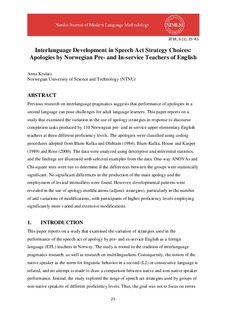Interlanguage development in speech act strategy choices: Apologies by Norwegian pre- and in-service teachers of English
Journal article, Peer reviewed
Published version
Permanent lenke
http://hdl.handle.net/11250/2563825Utgivelsesdato
2018Metadata
Vis full innførselSamlinger
- Institutt for lærerutdanning [3692]
- Publikasjoner fra CRIStin - NTNU [38127]
Originalversjon
Nordic Journal of Modern Language Methodology. 2018, 6 (1), 25-45.Sammendrag
Previous research on interlanguage pragmatics suggests that performance of apologies in a second language can pose challenges for adult language learners. This paper reports on a study that examined the variation in the use of apology strategies in response to discourse completion tasks produced by 110 Norwegian pre- and in-service upper-elementary English teachers at three different proficiency levels. The apologies were classified using coding procedures adopted from Blum-Kulka and Olshtain (1984), Blum-Kulka, House and Kasper(1989) and Rose (2000). The data were analyzed using descriptive and inferential statistics,and the findings are illustrated with selected examples from the data. One-way ANOVAs and Chi-square tests were run to determine if the differences between the groups were statistically significant. No significant differences in the production of the main apology and the employment of lexical intensifiers were found. However, developmental patterns were revealed in the use of apology modifications (adjunct strategies), particularly in the number of and variations of modifications, with participants of higher proficiency levels employing significantly more varied and extensive modifications.

